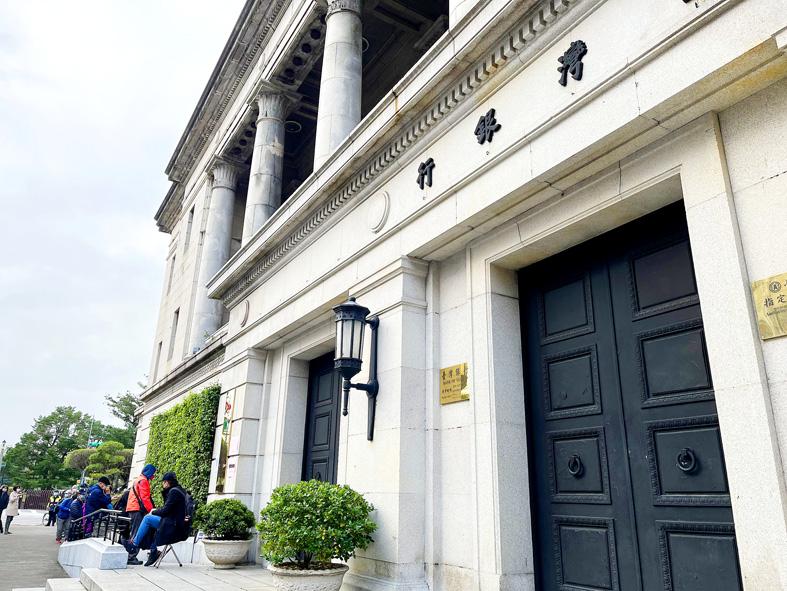State-run banks yesterday said that they would raise interest rates on savings deposits and loans after the central bank last week raised its policy rates by 25 basis points, but would approach the matter guided by business needs and other considerations.
Top officials from state-run lenders made known their intentions during a meeting of the legislature’s Finance Committee in Taipei, where lawmakers raised questions about the impact of the rate hikes.
State-owned Bank of Taiwan (臺灣銀行) has increased the interest rates on its savings deposits by 0.25 percentage points, but would not impose similar charges on all lending operations to retain customers, chairman Joseph Lyu (呂桔誠) said.

Photo: CNA
Starting yesterday, the nation’s largest lender by assets raised the interest rate on time savings deposits of different tenures by 25 basis points, benefits that failed to be extended to large deposits and demand deposit accounts.
Bank of Taiwan did not comment on how the rate hike would affect syndicated loans, land financing, corporate lending and mortgage operations.
Similarly, state-run Mega International Commercial Bank (兆豐銀行) is to raise interest rates on time savings deposits by 25 basis points, but the adjustment for demand deposits would be smaller, chairman Michael Chang (張兆順) said.
Taiwan Cooperative Bank (合庫銀行) chairman Lei Chung-dar (雷仲達) said that he would stand by the central bank’s policy in dealing with savings and loans except for demand deposits. Lenders generally offer very small interest rates for demand deposits.
State-run and private banks are to discuss lending rates this week and implement the changes next month.
Interest rates for mortgages are likely to rise from 1.31 percent to upward of 1.56 percent to reflect the central bank’s monetary normalization, adding an extra NT$1,200 (US$42.12) a month for homeowners with a NT$10 million mortgage.
Interest rates for land financing are likely to climb to at least 2.05 percent from 1.8 percent to help discourage land hoarding.
While ample liquidity and record-low borrowing costs aimed at mitigating the pain of the COVID-19 pandemic had helped drive up property prices, the increase in funding costs would reduce developers’ and builders’ financing needs, and the property market would reflect real demand by home buyers, Capital Investment Management Corp (群益投顧) said in a note yesterday, adding that demand would remain strong as the nation’s economic fundamentals continue to improve.
State-owned Land Bank of Taiwan (土地銀行) announced earlier that it would not take on new land financing after related lending approached the regulatory limit.
The Financial Supervisory Commission has tightened capital requirements for real-estate lending, obligating banks intent on growing their real-estate lending to demonstrate higher capitalization, but it remains to be seen if developers and builders would pass higher interest expenses to home buyers, analysts said.

UNCERTAINTY: Innolux activated a stringent supply chain management mechanism, as it did during the COVID-19 pandemic, to ensure optimal inventory levels for customers Flat-panel display makers AUO Corp (友達) and Innolux Corp (群創) yesterday said that about 12 to 20 percent of their display business is at risk of potential US tariffs and that they would relocate production or shipment destinations to mitigate the levies’ effects. US tariffs would have a direct impact of US$200 million on AUO’s revenue, company chairman Paul Peng (彭雙浪) told reporters on the sidelines of the Touch Taiwan trade show in Taipei yesterday. That would make up about 12 percent of the company’s overall revenue. To cope with the tariff uncertainty, AUO plans to allocate its production to manufacturing facilities in

TAKING STOCK: A Taiwanese cookware firm in Vietnam urged customers to assess inventory or place orders early so shipments can reach the US while tariffs are paused Taiwanese businesses in Vietnam are exploring alternatives after the White House imposed a 46 percent import duty on Vietnamese goods, following US President Donald Trump’s announcement of “reciprocal” tariffs on the US’ trading partners. Lo Shih-liang (羅世良), chairman of Brico Industry Co (裕茂工業), a Taiwanese company that manufactures cast iron cookware and stove components in Vietnam, said that more than 40 percent of his business was tied to the US market, describing the constant US policy shifts as an emotional roller coaster. “I work during the day and stay up all night watching the news. I’ve been following US news until 3am

COLLABORATION: Given Taiwan’s key position in global supply chains, the US firm is discussing strategies with local partners and clients to deal with global uncertainties Advanced Micro Devices Inc (AMD) yesterday said it is meeting with local ecosystem partners, including Taiwan Semiconductor Manufacturing Co (TSMC, 台積電), to discuss strategies, including long-term manufacturing, to navigate uncertainties such as US tariffs, as Taiwan occupies an important position in global supply chains. AMD chief executive officer Lisa Su (蘇姿丰) told reporters that Taiwan is an important part of the chip designer’s ecosystem and she is discussing with partners and customers in Taiwan to forge strong collaborations on different areas during this critical period. AMD has just become the first artificial-intelligence (AI) server chip customer of TSMC to utilize its advanced

Six years ago, LVMH’s billionaire CEO Bernard Arnault and US President Donald Trump cut the blue ribbon on a factory in rural Texas that would make designer handbags for Louis Vuitton, one of the world’s best-known luxury brands. However, since the high-profile opening, the factory has faced a host of problems limiting production, 11 former Louis Vuitton employees said. The site has consistently ranked among the worst-performing for Louis Vuitton globally, “significantly” underperforming other facilities, said three former Louis Vuitton workers and a senior industry source, who cited internal rankings shared with staff. The plant’s problems — which have not